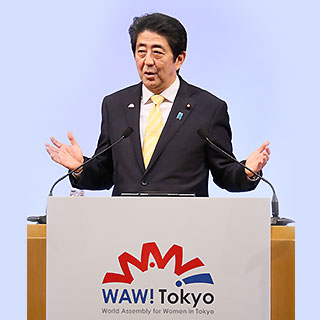WAW! 2015, or the second annual gathering of the World Assembly for Women in Tokyo, kicked off August 28th with an opening speech from Japanese Prime Minister Shinzo Abe, who set the tone for the two-day meeting with an uncompromising stance. Starting with the symposium’s theme of ‘WAW! for All,’ he called it “a message of women and men alike cooperating to create a society in which it is easy for both women and men to live.”
The prime minister laid out the benefits to all of society in such a world. “When this happens,” he said, “both men and women will be able to make highly productive jobs compatible with their bountiful daily lives naturally while they are able to lead more fulfilled lives as individuals, as well as within their families and communities.” The prime minister’s remarks were designed to set at ease any men who may be skeptical of more women in the workplace. “The dynamic engagement of women will also enrich men’s lives,” he said.
In a speech on the opening of the second day of WAW! 2015, Ms. Haruko Arimura, Japan’s Minister in charge of Women’s Empowerment, laid out her vision of success. “It is not just about making positive changes for women,” she explained, “but also making progress for men, the elderly, infants and children, people with disabilities and others.”
Now is the time for action
Prime Minister Abe pointed out progress that has recently been made in the empowerment of women in the workplace in Japan. “Around one million women have newly entered the labor market, while the number of female corporate board members has also increased by roughly 30 per cent,” he said.
The prime minister also expressed the need for legislation in order to hold the feet of business to the fire. “A new bill was enacted to promote the active engagement of women in society,” he said. “From April 2016, companies will be required to draw up and announce voluntary action plans incorporating numerical targets for promoting the hiring of women and the appointment of women to executive positions. True reform will not come about unless we have more women becoming leaders in their organizations, in addition to changes in men’s consciousness,” he insisted.
Prime Minister Abe believes that the keys to success are through more diversity, which is already being recognized and demonstrating positive results. “Diversity in human resources gives rise to innovation,” he said. “In Japan too, a large number of companies have begun to notice this fact. Women and diverse human resources send out new goods and services to the market by making best use of their own particular strengths and knowledge.”
In practice what this means is that Japan will no longer be able to accept business as usual, and Japanese organizations will be affected at the very core of their beings. “We will expand a corporate culture that values working efficiently within a limited number of hours,” Prime Minister Abe said. “Husbands will also actively take childcare leave and couples will share responsibility for household chores and child rearing. We will make this the ordinary practice in Japan.”
Global implications
Japan’s commitment to women extends to the world at large in a big way. Key to setting the nation on a sustainable path to gender equality as well as staking out a leadership role in the world is the nation’s alignment with the goals of UN Women, a United Nations entity working for the empowerment of women.
The prime minister was named as one of ten heads of state and government selected by UN Women to promote the dynamic engagement of women through top-down means. He used the occasion of WAW! 2015 to reinforce Japan’s commitment to the goals of UN Women, both within Japan through a national effort and on a global scale through increased ODA spending.
Prime Minister Abe pledged more than 42 billion yen in assistance towards “high-quality education for women and girls so that they will be economically independent and able to determine the course of their own lives through their own volition.” The prime minister said, “Next year, Japan will assume the G7 presidency, and I intend to push the agenda on women forward vigorously at the Ise-Shima Summit” in Japan. This includes linking the outcome of WAW! 2015 to the summit.
WAW! To Do
The outcome of WAW! 2015 is based on a ‘WAW! To Do’ list resulting from the exchange of ideas and common ground achieved by the many dignitaries, business leaders and gender equality experts who were the driving force of the symposium.
Each session wrapped up with a ‘WAW! To Do’ list, which was verbalized by a designated official at the closing session of the symposium. Recommendations centered on action items at the government, business, societal and individual levels for changing minds and overcoming challenges required for the empowerment of women to the good of society in Japan and indeed, worldwide.

